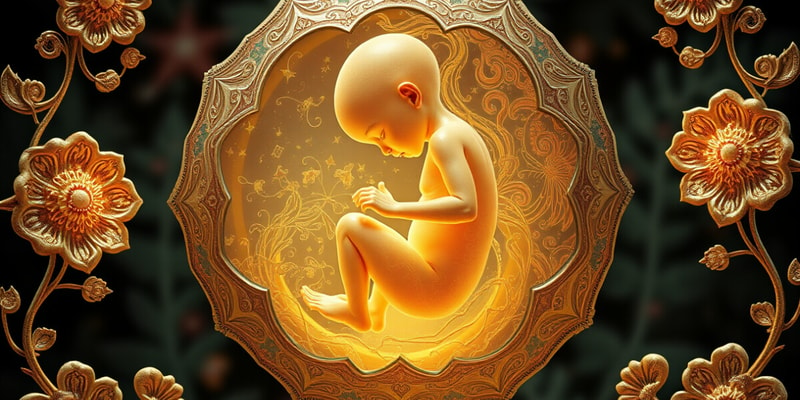Podcast
Questions and Answers
What is the primary consequence of hypermethylation of CpG islands?
What is the primary consequence of hypermethylation of CpG islands?
Which of the following accurately distinguishes between genetics and epigenetics?
Which of the following accurately distinguishes between genetics and epigenetics?
Which of the following best describes the role of non-coding RNAs in gene regulation?
Which of the following best describes the role of non-coding RNAs in gene regulation?
What is the chemical modification involved in DNA methylation?
What is the chemical modification involved in DNA methylation?
Signup and view all the answers
What is the primary function of histone modifications in gene expression?
What is the primary function of histone modifications in gene expression?
Signup and view all the answers
What occurs during the early stages of embryonic development from fertilization to gastrulation?
What occurs during the early stages of embryonic development from fertilization to gastrulation?
Signup and view all the answers
Which syndrome is associated with defects that can emerge from errors in embryonic development?
Which syndrome is associated with defects that can emerge from errors in embryonic development?
Signup and view all the answers
What do the sex chromosomes in human somatic cells consist of?
What do the sex chromosomes in human somatic cells consist of?
Signup and view all the answers
What is the main function of meiosis in human development?
What is the main function of meiosis in human development?
Signup and view all the answers
Which statement accurately describes the concept of epigenetics in the context of embryonic development?
Which statement accurately describes the concept of epigenetics in the context of embryonic development?
Signup and view all the answers
What is the term used to describe the amount of DNA after replication during the S phase?
What is the term used to describe the amount of DNA after replication during the S phase?
Signup and view all the answers
How are homologous sets of autosomes characterized in human somatic cells?
How are homologous sets of autosomes characterized in human somatic cells?
Signup and view all the answers
What developmental stage follows after fertilization in human embryonic development?
What developmental stage follows after fertilization in human embryonic development?
Signup and view all the answers
During which phase does DNA first replicate in the cell cycle?
During which phase does DNA first replicate in the cell cycle?
Signup and view all the answers
Which of the following processes involves two sets of cell divisions occurring in quick succession?
Which of the following processes involves two sets of cell divisions occurring in quick succession?
Signup and view all the answers
What is the primary purpose of studying embryology in a medical context?
What is the primary purpose of studying embryology in a medical context?
Signup and view all the answers
What is the initial stage of prenatal development marked by cellular proliferation?
What is the initial stage of prenatal development marked by cellular proliferation?
Signup and view all the answers
Which concept describes the ability of cells to respond to inducers during development?
Which concept describes the ability of cells to respond to inducers during development?
Signup and view all the answers
What initiates the differentiation process in cells during embryonic development?
What initiates the differentiation process in cells during embryonic development?
Signup and view all the answers
Which of the following best describes the morula?
Which of the following best describes the morula?
Signup and view all the answers
Which of the following structures forms after the morula, upon fluid accumulation and cell realignment?
Which of the following structures forms after the morula, upon fluid accumulation and cell realignment?
Signup and view all the answers
What roles do homeobox genes, growth factors, and retinoic acids play in embryonic development?
What roles do homeobox genes, growth factors, and retinoic acids play in embryonic development?
Signup and view all the answers
Which process is characterized by complex embryologic processes including morphological changes and cellular migration?
Which process is characterized by complex embryologic processes including morphological changes and cellular migration?
Signup and view all the answers
What structural change occurs at about day 8 of gestation regarding the embryoblast?
What structural change occurs at about day 8 of gestation regarding the embryoblast?
Signup and view all the answers
Which of the following correctly identifies the two layers formed from the bilaminar disc?
Which of the following correctly identifies the two layers formed from the bilaminar disc?
Signup and view all the answers
During gastrulation, what happens to the cells that pass through the primitive streak?
During gastrulation, what happens to the cells that pass through the primitive streak?
Signup and view all the answers
Which germ layer is primarily responsible for developing the nervous system?
Which germ layer is primarily responsible for developing the nervous system?
Signup and view all the answers
What is a consequence of the malfunction of meiosis during fertilization?
What is a consequence of the malfunction of meiosis during fertilization?
Signup and view all the answers
What primary germ layer gives rise to the circulatory system?
What primary germ layer gives rise to the circulatory system?
Signup and view all the answers
What condition results from a zygote having 47 chromosomes due to the fusion of a gamete with 24 chromosomes?
What condition results from a zygote having 47 chromosomes due to the fusion of a gamete with 24 chromosomes?
Signup and view all the answers
What structure forms the roof of the secondary yolk sac?
What structure forms the roof of the secondary yolk sac?
Signup and view all the answers
What anatomical feature indicates the head end of the embryo?
What anatomical feature indicates the head end of the embryo?
Signup and view all the answers
Which developmental stage follows the formation of the bilaminar disc?
Which developmental stage follows the formation of the bilaminar disc?
Signup and view all the answers
What is a common clinical feature of Turner syndrome?
What is a common clinical feature of Turner syndrome?
Signup and view all the answers
Which condition is caused by an alteration in the X chromosome?
Which condition is caused by an alteration in the X chromosome?
Signup and view all the answers
Which of the following statements accurately describes autosomal dominant inheritance?
Which of the following statements accurately describes autosomal dominant inheritance?
Signup and view all the answers
What characterizes epigenetic changes compared to genetic changes?
What characterizes epigenetic changes compared to genetic changes?
Signup and view all the answers
In Klinefelter syndrome, which of the following features is most commonly observed?
In Klinefelter syndrome, which of the following features is most commonly observed?
Signup and view all the answers
What defines the phenotype of an individual?
What defines the phenotype of an individual?
Signup and view all the answers
Which of the following conditions is an example of autosomal recessive inheritance?
Which of the following conditions is an example of autosomal recessive inheritance?
Signup and view all the answers
What is true about trisomy?
What is true about trisomy?
Signup and view all the answers
Which of the following alterations account for approximately 10% of all human malfunctions?
Which of the following alterations account for approximately 10% of all human malfunctions?
Signup and view all the answers
How does the genotype differ from the phenotype?
How does the genotype differ from the phenotype?
Signup and view all the answers
Study Notes
Early Embryology and Gastrulation
- Embryonic Development Stages: Covers development from fertilization to gastrulation (weeks 1-3).
- Defects in Development: Discusses known defects like Down’s syndrome and Turner syndrome.
- Epigenetic Influence: Genetic and epigenetic processes play key roles in early embryonic development.
Importance of Studying Embryology
- Head and Neck Development: Understanding embryology is critical for comprehending facial and dental development origins.
- Congenital Defects: Provides insights into causes of congenital defects in related tissues.
- Regenerative Medicine: Relevant for understanding mechanisms in regenerative medicine and dentistry.
Germ Cell Formation and Fertilization
- Somatic Cells: Human somatic cells have 46 chromosomes comprising 44 autosomes and 2 sex chromosomes (X & Y).
- Haploid and Diploid: Gametes are haploid (23 chromosomes); fertilization creates a diploid zygote (46 chromosomes).
- Meiosis vs. Mitosis: Meiosis results in gametes; mitosis results in somatic cell division after DNA replication.
Prenatal Development Stages
- Stage 1 (0-4 weeks): Involves cellular proliferation and migration.
- Stage 2: Morphogenetic processes begin.
- Stage 3: Entails growth and maturation.
Induction, Competence, and Differentiation
- Patterning: Involves initial axial specification and segmentation.
- Induction: Signals cells to differentiate; key agents include homeobox genes and growth factors.
Week 1: From Fertilization to Blastocyst
- Initial Cell Division: The fertilized egg becomes a morula through rapid divisions.
- Blastocyst Formation: Cells reorganize into the blastocyst, consisting of the embryoblast and trophoblast.
Week 2: Implantation of Blastocyst
- Bilaminar Disc: Formation of a two-layered structure (epiblast and hypoblast) occurs around day 8 of gestation.
Week 3: Gastrulation
- Trilaminar Disc Formation: Converts the bilaminar disc into a structure with three primary germ layers: ectoderm, mesoderm, and endoderm.
- Primitive Streak Formation: Initiates extensive cellular rearrangement and migration.
Fate of Germ Layers
- Ectoderm: Forms nervous system, sensory organs, epidermis, and pituitary gland.
- Mesoderm: Develops into notochord, skeleton, muscles, circulatory system, and dermis.
- Endoderm: Forms inner linings of digestive and respiratory tracts, pancreas, and liver.
Defects in Embryonic Development
- Chromosomal Abnormalities: Meiosis malfunction can lead to congenital anomalies affecting head and neck regions.
- Down Syndrome: Result of trisomy 21; characterized by facial clefts and delayed tooth eruption.
- Turner Syndrome (X0): Missing X chromosome leads to short stature and various clinical features.
- Klinefelter Syndrome (XXY): Extra X chromosome results in taller stature and gynecomastia.
Genotype vs. Phenotype
- Genetic Defects: Refer to abnormalities in genetic makeup.
- Genotype: Underlies characteristics affected by environmental context.
- Phenotype: Represents observable traits resulting from development.
Genetics vs. Epigenetics
- Genetics: Examines genes and hereditary information.
- Epigenetics: Involves how behaviors and environment can modify gene expression without changing the DNA sequence.
Mechanisms of Epigenetics
- DNA Methylation: Addition of methyl groups to cytosines affects gene transcription; hypermethylation decreases transcription, while hypomethylation increases it.
- Histone Modification: Changes to histones regulate transcription factor activity.
- Non-coding RNA: Includes siRNA and miRNA, which regulate gene expression and differentiation.
Summary of Differences:
- Genetics vs. Epigenetics: Genetics refers to inherited traits; epigenetics concerns gene activity regulation and environmental influences.
Studying That Suits You
Use AI to generate personalized quizzes and flashcards to suit your learning preferences.
Related Documents
Description
This quiz delves into the critical stages of embryonic development from fertilization to gastrulation, alongside discussions on congenital defects such as Down's syndrome. It emphasizes the importance of understanding embryology for facial development and its implications in regenerative medicine. Test your knowledge on early embryology and its significance in medical fields.




